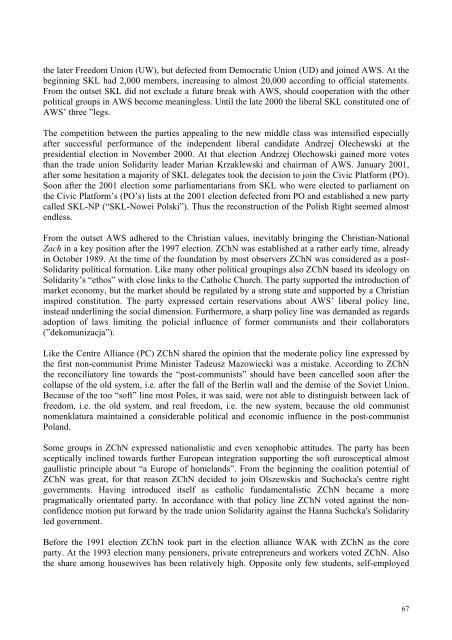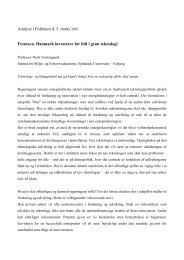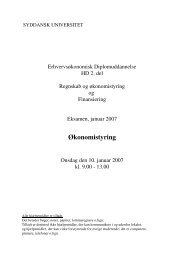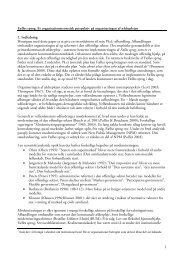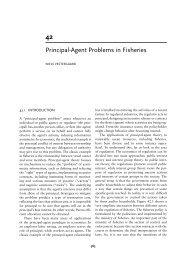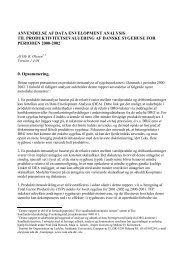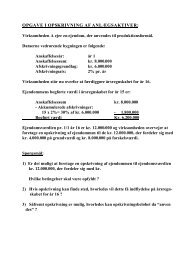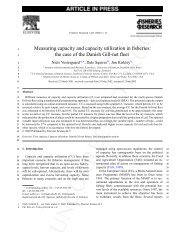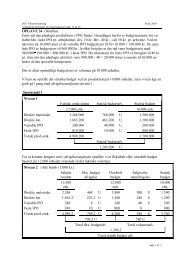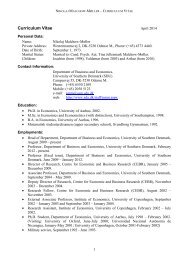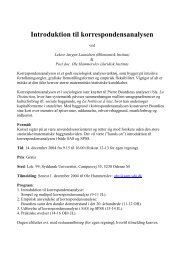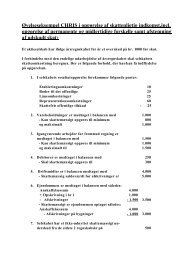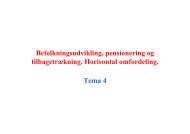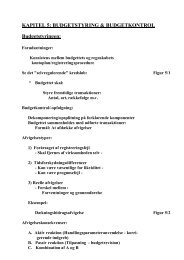2001 parliamentary election, however, without underm<strong>in</strong><strong>in</strong>g SLD-UP’s then strong electoralposition.At the September 2001 election AWSP lost parliamentary representation, obta<strong>in</strong><strong>in</strong>g only 5.5 pct. <strong>of</strong>the votes, less than dem<strong>and</strong>ed for party alliances to be represented <strong>in</strong> the parliament. The Polishright became represented by nationalist The League <strong>of</strong> Families (LPR) <strong>and</strong> Kaczynskis “Law <strong>and</strong>Justice <strong>Party</strong>” ( PiS). The liberal side <strong>of</strong> the political spectrum was represented by the CitizenPlatform (OP), <strong>in</strong> the beg<strong>in</strong>n<strong>in</strong>g <strong>of</strong> 2001 it was jo<strong>in</strong>ed by the SKL, until then a AWS faction. Boththe Freedom Union (UW) <strong>and</strong> the AWS (Solidarnosc), two found<strong>in</strong>g parties with a background <strong>in</strong>the Solidarity movement <strong>and</strong> occupy<strong>in</strong>g several governmental posts <strong>in</strong> the years s<strong>in</strong>ce 1989, did notpass the treshold requirements.The question has been raised, why the party alliance AWS failed while the left w<strong>in</strong>g SLDsucceeded. As argued by Michael D. Kennedy (Kennedy, 1991:180), it may be useful to dist<strong>in</strong>guishbetween different types <strong>of</strong> party alliances, some have been based on economic <strong>in</strong>teraction, i.e. oncommon socio-economic <strong>in</strong>terests <strong>and</strong> networks, others based on self-identification, i.e. held up byreference to a common enemy (“We” versus “Them”), i.e. the (post)communists. Focus on thecommon “enemy” <strong>in</strong>evitably re<strong>in</strong>force moral policy positions with a narrow space for politicalnegotiations as negotiations signify moral compromise. Inside the “identity” type <strong>of</strong> alliancesprogrammatic, policy <strong>and</strong> <strong>in</strong>stitutional questions <strong>and</strong> the economic goal function are neglected.Most voters seem prefer programme <strong>and</strong> well <strong>in</strong>stitutionalised or- alternatively- extreme populistparties, however, until the 2001 election that type <strong>of</strong> parties could not be found on the Polish Right.Furthermore, many problems have been policy-related bound to the low quality <strong>of</strong> publicgovernance. As noted by Lena Kolarska-Bob<strong>in</strong>ska 58 , a precondition for a political success is that thepolicy content is communicated to the people properly. Time had passed when parliamentaryelections can be won only by us<strong>in</strong>g vague <strong>and</strong> broad political appeals based on abstract <strong>and</strong>symbolic politics. More important than a cab<strong>in</strong>et reshuffles <strong>and</strong> <strong>in</strong>stitutional <strong>in</strong>fight<strong>in</strong>gs is toimprove the whole philosophy <strong>of</strong> public governance <strong>and</strong> the mode <strong>of</strong> decision-mak<strong>in</strong>g (”filoz<strong>of</strong>iarzadzenia”) <strong>and</strong> policy implementation. Unfortunately, from the outset the party alliance AWS (<strong>and</strong>RS AWS) used too much energy to <strong>in</strong>itiate destructive wars aga<strong>in</strong>st itself (”walka AWS z AWS”).Summariz<strong>in</strong>g, we can say that AWS’ problems can be found on different levels <strong>of</strong> analysis, onhistorical level <strong>in</strong> the shape <strong>of</strong> a reactivation <strong>of</strong> old “We-Them” contradictions <strong>in</strong> society with thebuilt-<strong>in</strong> tendency towards "over-ideologisation" <strong>and</strong> symbolic politics, on <strong>in</strong>stitutional level <strong>in</strong> theshape <strong>of</strong> <strong>in</strong>efficient party organisation <strong>and</strong> bad <strong>in</strong>stitutionalisation, on actor-behavioural level <strong>in</strong> theshape <strong>of</strong> too many “wars <strong>in</strong> the top” characterised by extremely low party loyalty <strong>and</strong> cohesion, <strong>and</strong>f<strong>in</strong>ally on policy-level <strong>in</strong> the shape <strong>of</strong> several disagreements as regards the concrete “day to day”policy.2.11. AWS’ other ”legs”In this conclud<strong>in</strong>g section AWS’ other ”legs” will be exam<strong>in</strong>ed <strong>in</strong> more details. As noted above, thefaction SKL has represented the conservative-liberal l<strong>in</strong>e. SKL was founded December 1997, <strong>and</strong>20 persons from SKL were elected to parliament at the 1997 election. SKL was badly organized atleast compared with the Christian-National factions <strong>in</strong>side AWS. Prom<strong>in</strong>ent politicians from SKL,e.g. Jan Maria Rokita <strong>and</strong> Aleks<strong>and</strong>er Hall, had been former members <strong>of</strong> Democratic Union (UD),58 Lena Kolarska-Bob<strong>in</strong>ska, ”Kapitalizm nie taki, jaki mial byc”, Gazeta Wyborcza 6.-7. 11. 1999:2-3.66
the later Freedom Union (UW), but defected from Democratic Union (UD) <strong>and</strong> jo<strong>in</strong>ed AWS. At thebeg<strong>in</strong>n<strong>in</strong>g SKL had 2,000 members, <strong>in</strong>creas<strong>in</strong>g to almost 20,000 accord<strong>in</strong>g to <strong>of</strong>ficial statements.From the outset SKL did not exclude a future break with AWS, should cooperation with the otherpolitical groups <strong>in</strong> AWS become mean<strong>in</strong>gless. Until the late 2000 the liberal SKL constituted one <strong>of</strong>AWS’ three ”legs.The competition between the parties appeal<strong>in</strong>g to the new middle class was <strong>in</strong>tensified especiallyafter successful performance <strong>of</strong> the <strong>in</strong>dependent liberal c<strong>and</strong>idate Andrzej Olechewski at thepresidential election <strong>in</strong> November 2000. At that election Andrzej Olechowski ga<strong>in</strong>ed more votesthan the trade union Solidarity leader Marian Krzaklewski <strong>and</strong> chairman <strong>of</strong> AWS. January 2001,after some hesitation a majority <strong>of</strong> SKL delegates took the decision to jo<strong>in</strong> the Civic Platform (PO).Soon after the 2001 election some parliamentarians from SKL who were elected to parliament onthe Civic Platform’s (PO’s) lists at the 2001 election defected from PO <strong>and</strong> established a new partycalled SKL-NP (“SKL-Nowei Polski”). Thus the reconstruction <strong>of</strong> the Polish Right seemed almostendless.From the outset AWS adhered to the Christian values, <strong>in</strong>evitably br<strong>in</strong>g<strong>in</strong>g the Christian-NationalZach <strong>in</strong> a key position after the 1997 election. ZChN was established at a rather early time, already<strong>in</strong> October 1989. At the time <strong>of</strong> the foundation by most observers ZChN was considered as a post-Solidarity political formation. Like many other political group<strong>in</strong>gs also ZChN based its ideology onSolidarity’s “ethos” with close l<strong>in</strong>ks to the Catholic Church. The party supported the <strong>in</strong>troduction <strong>of</strong>market economy, but the market should be regulated by a strong state <strong>and</strong> supported by a Christian<strong>in</strong>spired constitution. The party expressed certa<strong>in</strong> reservations about AWS’ liberal policy l<strong>in</strong>e,<strong>in</strong>stead underl<strong>in</strong><strong>in</strong>g the social dimension. Furthermore, a sharp policy l<strong>in</strong>e was dem<strong>and</strong>ed as regardsadoption <strong>of</strong> laws limit<strong>in</strong>g the policial <strong>in</strong>fluence <strong>of</strong> former communists <strong>and</strong> their collaborators(”dekomunizacja”).Like the Centre Alliance (PC) ZChN shared the op<strong>in</strong>ion that the moderate policy l<strong>in</strong>e expressed bythe first non-communist Prime M<strong>in</strong>ister Tadeusz Mazowiecki was a mistake. Accord<strong>in</strong>g to ZChNthe reconciliatory l<strong>in</strong>e towards the “post-communists” should have been cancelled soon after thecollapse <strong>of</strong> the old system, i.e. after the fall <strong>of</strong> the Berl<strong>in</strong> wall <strong>and</strong> the demise <strong>of</strong> the Soviet Union.Because <strong>of</strong> the too “s<strong>of</strong>t” l<strong>in</strong>e most Poles, it was said, were not able to dist<strong>in</strong>guish between lack <strong>of</strong>freedom, i.e. the old system, <strong>and</strong> real freedom, i.e. the new system, because the old communistnomenklatura ma<strong>in</strong>ta<strong>in</strong>ed a considerable political <strong>and</strong> economic <strong>in</strong>fluence <strong>in</strong> the post-communistPol<strong>and</strong>.Some groups <strong>in</strong> ZChN expressed nationalistic <strong>and</strong> even xenophobic attitudes. The party has beensceptically <strong>in</strong>cl<strong>in</strong>ed towards further European <strong>in</strong>tegration support<strong>in</strong>g the s<strong>of</strong>t eurosceptical almostgaullistic pr<strong>in</strong>ciple about “a Europe <strong>of</strong> homel<strong>and</strong>s”. From the beg<strong>in</strong>n<strong>in</strong>g the coalition potential <strong>of</strong>ZChN was great, for that reason ZChN decided to jo<strong>in</strong> Olszewskis <strong>and</strong> Suchocka's centre rightgovernments. Hav<strong>in</strong>g <strong>in</strong>troduced itself as catholic fundamentalistic ZChN became a morepragmatically orientated party. In accordance with that policy l<strong>in</strong>e ZChN voted aga<strong>in</strong>st the nonconfidencemotion put forward by the trade union Solidarity aga<strong>in</strong>st the Hanna Suchcka's Solidarityled government.Before the 1991 election ZChN took part <strong>in</strong> the election alliance WAK with ZChN as the coreparty. At the 1993 election many pensioners, private entrepreneurs <strong>and</strong> workers voted ZChN. Alsothe share among housewives has been relatively high. Opposite only few students, self-employed67
- Page 3:
“This provisional situation chara
- Page 6 and 7:
marketisation and privatisationshor
- Page 8 and 9:
purposes, are channels for “expre
- Page 10 and 11:
the significance of strategic choic
- Page 12 and 13:
presidentialism gave rise to “flo
- Page 14 and 15:
antipolitics and reinforcement of a
- Page 16 and 17: In the late 1990’s elections most
- Page 18 and 19: determined primarily by “politica
- Page 20 and 21: politics and antipolitics, all sign
- Page 22 and 23: which attitudes to state regulation
- Page 24 and 25: Anti-communism has been defined in
- Page 26 and 27: elections and the Slovak communists
- Page 28 and 29: Cartel agreementsbetter representat
- Page 30 and 31: Basically the absence of clear cons
- Page 32 and 33: After 1989 different types of polit
- Page 34 and 35: complex project for transition unde
- Page 36 and 37: window of opportunity in spite of s
- Page 38 and 39: analyses of party institutionalizat
- Page 40 and 41: political messages and slogans. Thu
- Page 42 and 43: well established party culture may
- Page 44 and 45: expected, much due to the many spli
- Page 46 and 47: Furthermore, the polarisation on el
- Page 48 and 49: Finally, Solidarity can also be con
- Page 50 and 51: whole, on the one side an authorita
- Page 52 and 53: The economic recession and the grav
- Page 54 and 55: election defeat more cooperation an
- Page 56 and 57: The formation of AWS can be conside
- Page 58 and 59: group. RS AWS constituted the Chris
- Page 60 and 61: According to the original plans the
- Page 62 and 63: values. According to Rybicki, as so
- Page 64 and 65: AWS should fight against all types
- Page 68 and 69: and workers voted ZChN. At the 1993
- Page 70 and 71: The League has been considered as a
- Page 72 and 73: establishment like than LPR’s. Th
- Page 74 and 75: jobs in rural areas, especially sma
- Page 76 and 77: industrial policy. According to the
- Page 78 and 79: pressurizing the government to give
- Page 80 and 81: democrats, thereby locating itself
- Page 82 and 83: To conclude, the Freedom Union (UW)
- Page 84 and 85: Polish middle class. Thus, in Janua
- Page 86 and 87: such as KSCM and KSS in The Czech R
- Page 88 and 89: The SLD leaders were mainly recruit
- Page 90 and 91: the falling popular support for pri
- Page 92 and 93: innovation was formation of the pol
- Page 94 and 95: place after talks with each applica
- Page 96 and 97: Has the Left any freedom of manoeuv
- Page 98 and 99: medicine, changes in the labour cod
- Page 100 and 101: The Labour Union (UP), Democratic U
- Page 102: Nevertheless, before that had taken


